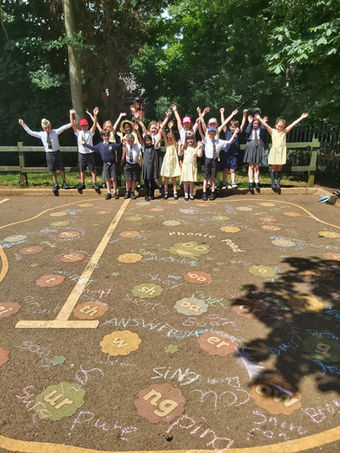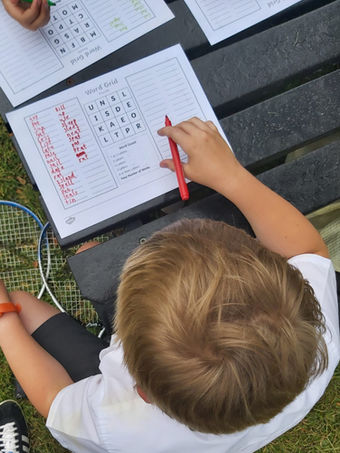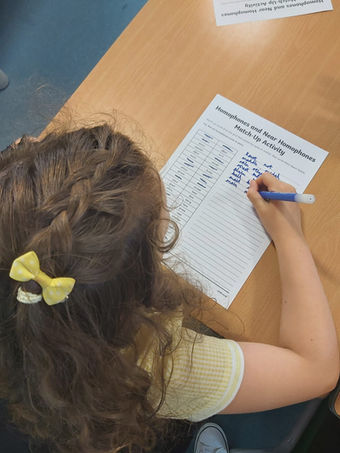
Pisownia
To support the planning and delivery of spelling in school, we use Purple Mash as an anchor, utilising the structure and resources as the basis for our daily Spelling (Word Work) lessons. This is a clear and systematic approach which will provide our pupils with life-long strategies. Consistently utilising this scheme from Year 1 and beyond ensures breadth and coverage of all the National Curriculum spelling requirements for each year group.
The Purple Mash resources allow of range of strategies to be incorporated into Word Work lessons – making sure that the students explore a range of ways to learn and understand spelling. By working through a set of 10 words in a week through using Purple Mash, students are taught to discover the definitions, complete games and challenges on the words and secure their understanding using a daily ‘Look, Say, Cover, Write, Check’ informal assessment. At home, pupils are set a fun and interactive online quiz to revise spellings in an engaging and creative way.
Letter-join handwriting scheme is used to support spelling activities through the school.
Vocabulary Work
Through using Mrs Wordsmith's resources, students study a word of the day to develop their vocabulary and understanding of a wider range of challenging words. Teachers share the exciting word with the class (as varied as ‘Swagger’ and ‘Tempestuous’) to develop etymology (where words originate from) and morphology (how words are structured, such as adding prefixes and suffixes), as well as providing students with a wealth of vocabulary that they can use in their writing.
This dynamic and exciting discovery of language opens lessons and develops the love of words that we strive to embed at The Grange.
Spelling in Foundation Stage 1
Spelling in Early Years is fundamentally taught through phonics. In Foundation Stage, activities are set up in provision for children to practise and rehearse their newly learnt skills taught in sessions. These are sometimes guided but often independent. As soon as children enter our setting, they will be ‘mark-making’ using a wide variety of resources such as chalk, pens, pencils, crayons etc.
Letter formation and correct pencil grip is taught throughout Reception alongside activities such as brain gym and looking at the children’s midline. The use of playdough in the enhanced provision is a strengthen tool for their hand muscles to ensure children are ready to write. The use of the interactive whiteboard is tool used to help children show control on a larger scale. Outdoor learning provides opportunities for children to use paint brushes with water. Mud painting on clear easels is another way the children can build on their fine motor control and how to hold a pencil correctly and effectively.
Beyond the RWI programme, children continue to apply the strategies learnt in phonics lessons to spelling through use of Purple Mash’s resources.
A lot of children can perform in a spelling test, but cannot apply these spellings in their writing, therefore this list of words is not sent home to learn. Instead, a fun and interactive quiz is available for children to complete online at home. This is to develop their confidence with spelling in a =n online, fun format, aiming to secure an understanding of the spellings to ensure accurate application in their writing.
The Grange’s use of Mrs Wordsmith books and Purple Mash is a way of teaching spelling that allows teachers to bring the ‘wonder of words’ to life. It provides a clear structure and support to teachers whilst also allowing room for creativity, such as through fun assessments, spelling games and the exploration of definitions and meanings.
Each class will learn spelling rules, strategies and word lists specific to their year group ensuring that all National Curriculum fundamentals are covered in detail.
Teachers are guided through the rationale and approaches to ensure that they have a deep understanding of the processes they can follow to become more effective teachers of spelling. Pupils will extend their knowledge of phonics throughout their time in primary school. They will improve their outcomes as they develop a culture of becoming passionate about words, instead of being demotivated by the repetitive failure of the weekly ’spelling test’ and they will acquire a range of strategies to apply during real-life composition of writing.
Children are taught to how to segment to spell during phonic sessions and this is continuously rehearsed during writing sessions and when in the provision. High frequency words are also taught during phonic sessions and these are then on display so children can access them at all times when they are writing. Phoneme mats and spelling mats are also used to support children when they are attempting to write and spell independently.
Spelling in Key Stage 1
As with Foundation Stage, spelling in Key Stage 1 is fundamentally taught through phonics. In Year 1, phonic sessions continue to teach children how to segment to spell using known phonemes/graphemes. As Phase 5 introduces lots of alternative phonemes for each grapheme, children are taught the spelling rules and how to choose the ‘best bet’. Children are encouraged to ‘have a go’ and often make incorrect choices but as long as attempts are phonetically plausible, that’s ok! As mentioned previously, spelling lags behind reading as spelling is harder.
In Year 2, phonic sessions continue. It is during Phase 6 that children become fluent readers and increasingly accurate spellers. Spelling in Year 2 is formally assessed at the end of the year when the children complete their end of Key Stage SATs.
Spelling in Years 1 to 6
In Years 1 to 6, weekly Spelling (Word Work) sessions take place, combining Mrs Wordsmith vocabulary analysis and Purple Mash Spelling resources.
The ‘Look, Say, Cover, Write, Check’ daily segment of the lesson encourages children to develop their verbal understanding of the word, and to hear the sounds within it – looking back at the phonic work undertaken in RWI – and to build their accuracy of their weekly spelling words.
Pupils will also work on their own, individualised spelling plan. These are called ‘My Focus Five’. With support of the class teacher, children will identify five words that they are finding tricky to spell. These will be recorded in their spelling journals on their ‘Focus Five’ grid. They will identify the tricky part and think of ways to remember how to spell those words correctly. Once these words have been used correctly in their writing three times, new words will be identified to focus on.
Spelling is assessed formally at the end of Year 6 when the children complete their end of Key Stage SATs. In other year groups, spelling is assessed twice per year through our optional SATs programme. A Spelling Age test will be completed twice in the year. The Spelling Age will be calculated based on results of the spelling assessment, which will be compared with a student’s chronological age. (Please see our Assessment Policy for further information). Doing further assessments provides more information for each student as a Speller.






